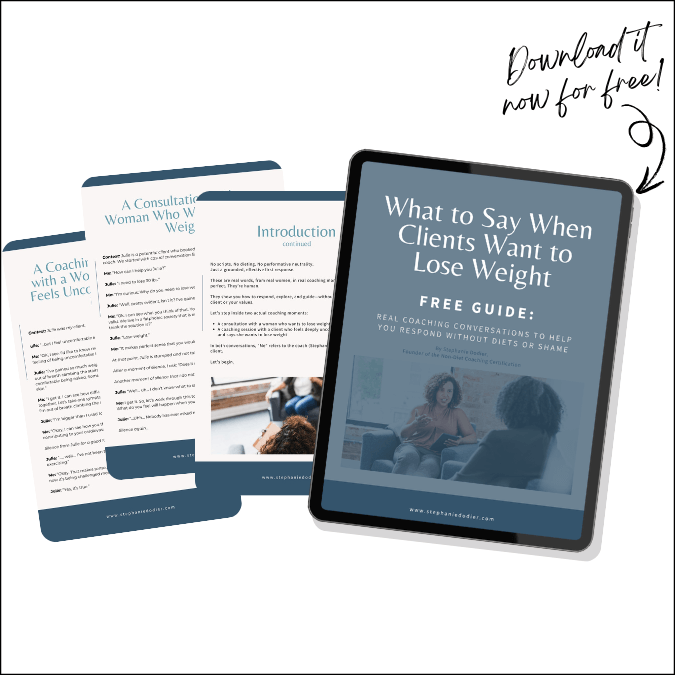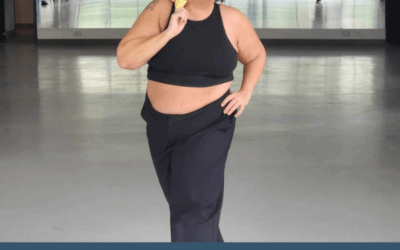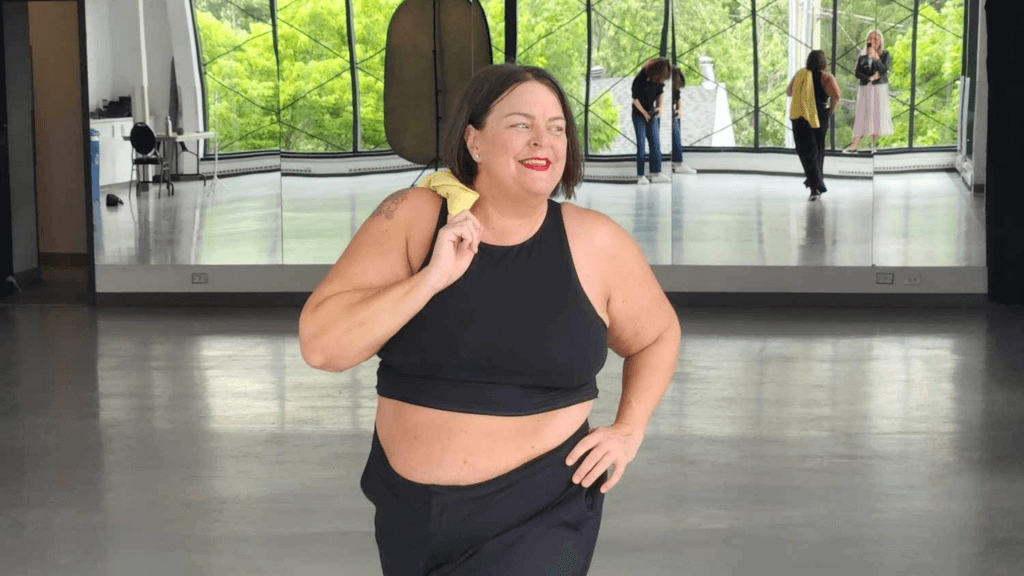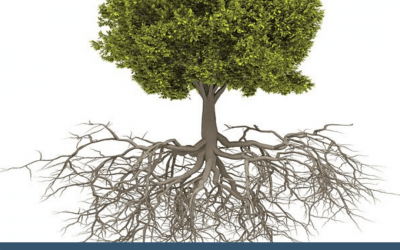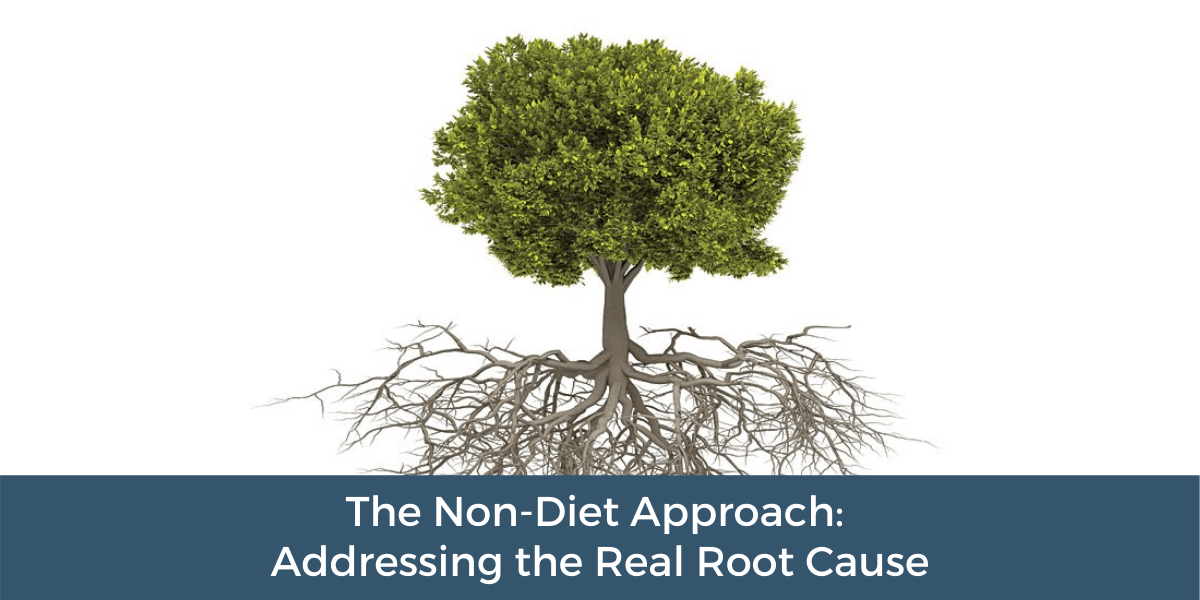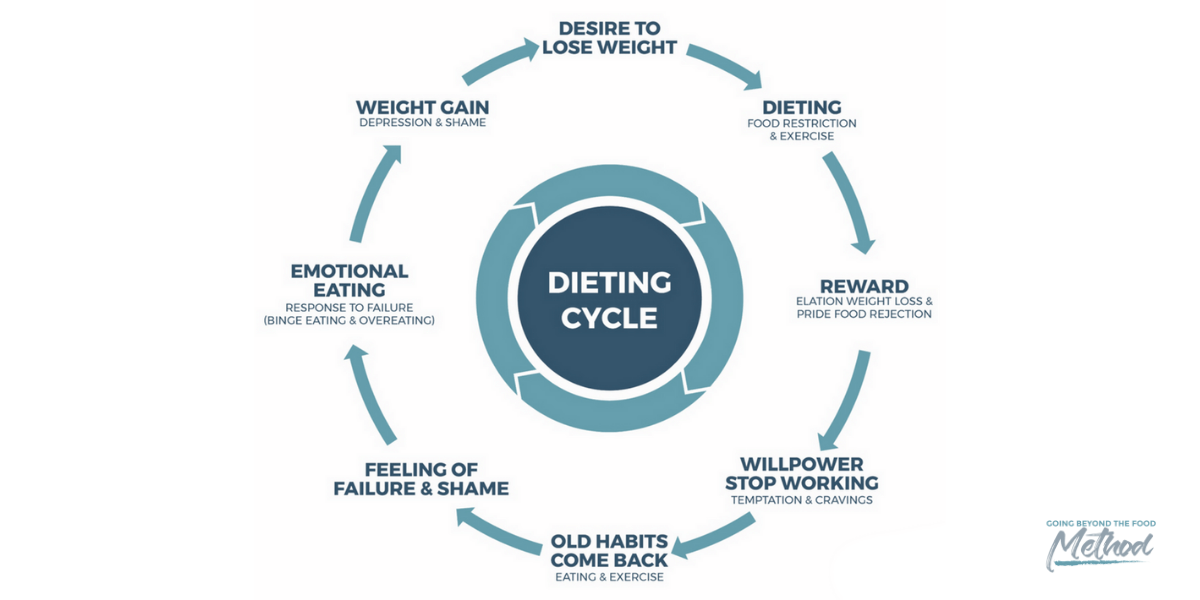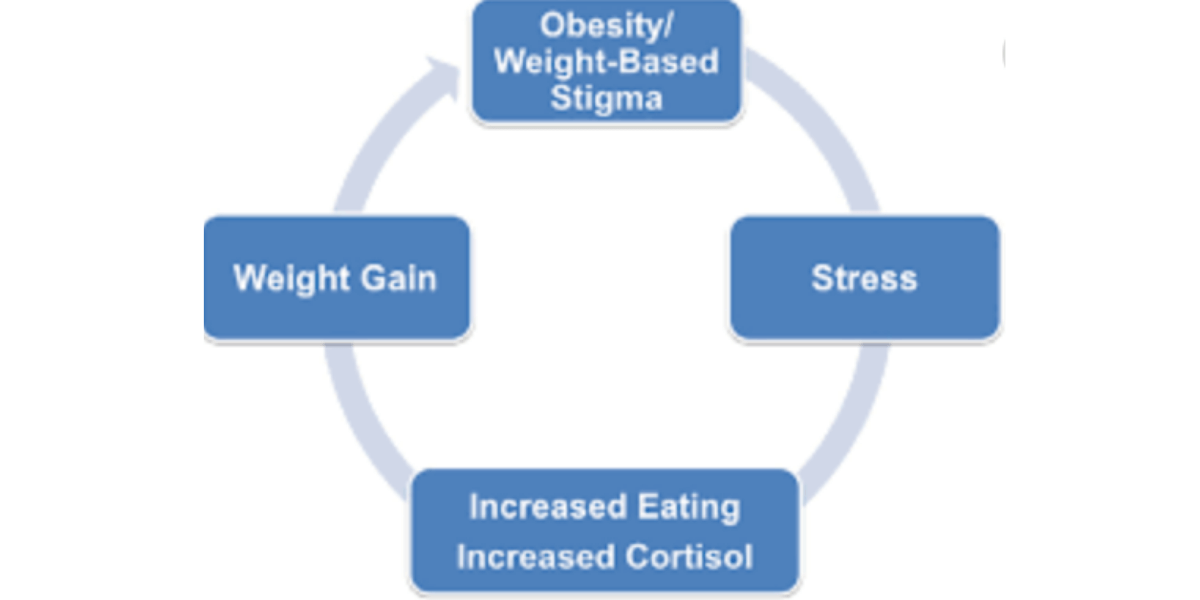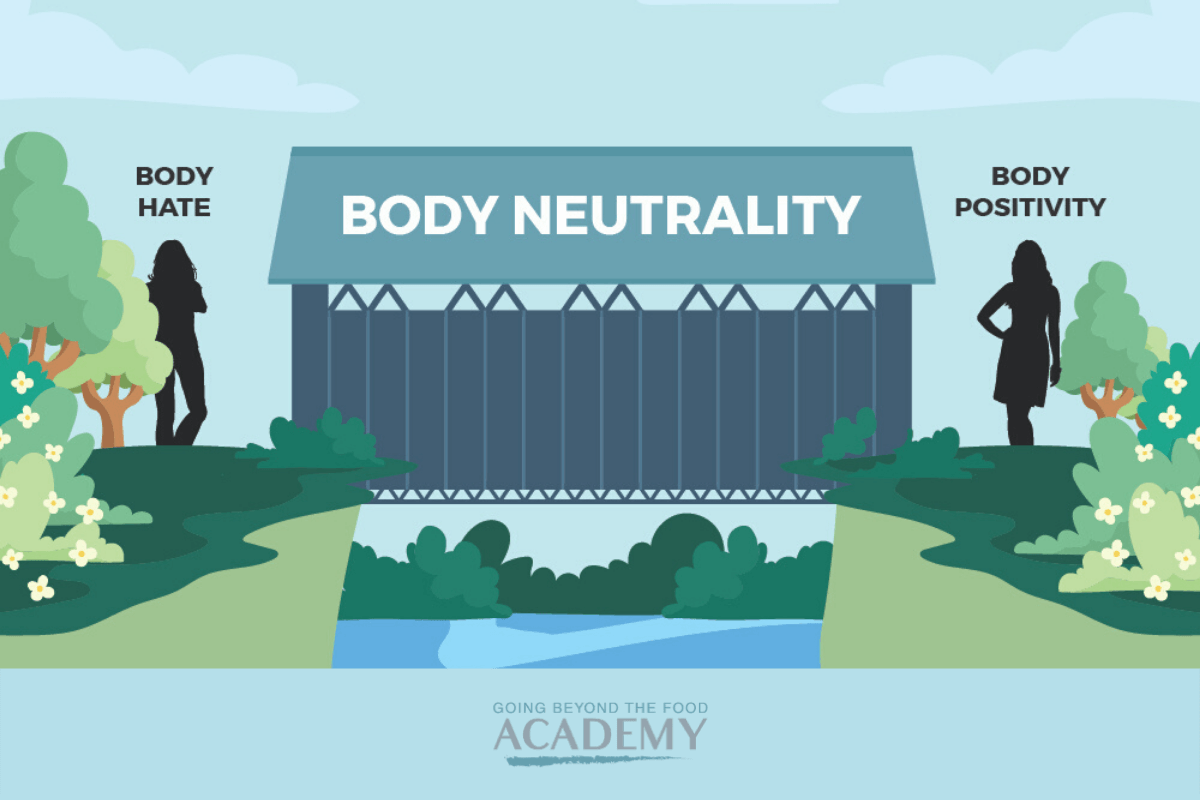What’s the connection between intuitive eating and hormones?
Women love intuitive eating as a concept but often will refute it based on other pieces of advice they’ve received, found, or read on the internet. One of the most frequent situations I encounter is with hormonal health. Women who want to balance their hormones are being told that, to achieve such goal, they must restrict certain foods, go on a reset hormonal diet, or do an elimination diet. Therefore, they can’t be intuitive eaters.
“I love intuitive eating, but I’m working on balancing my hormones. I read Dr. XXXX book and she says that I must restrict all grains and dairy. Maybe later I can become an intuitive eater.”
Is this true? Is food restriction the solution to hormonal health?
I’m not a hormone specialist. But I’m a Clinical Nutritionist and knowledgeable enough to know that this statement isn’t totally true.
Is food a contributing factor to health: YES.
Is food restriction the only way to “balance hormones”? NO.
Can hormonal balance even be possible? Well yes and no. More on that later.
So, why then are we sold “hormone reset diet” as the way to balance the female hormone?
The answer is simple…
DIET CULTURE, sisters!


I’m going to talk about hormonal balance, what really affects it aside from food, what wellness diets try to hide from you, and why food restriction may do more harm than good to your hormonal health. In this article about intuitive eating and hormones, you will learn:
The wellness diet and hormones
Inflammation and hormonal health
Intuitive eating and hormones: Why intuitive eating may be the key to hormonal health
Weight neutral approach to hormonal health
What is Intuitive Eating?
Perhaps the most concise intuitive eating definition I can give you is it’s a proven self-care eating framework that helps you heal your relationship with food. It teaches you to distinguish between emotional hunger from physical hunger, and to tap into your eating cues — your hunger, your fullness, and your satisfaction cues–to know what, when, and how to eat. It’s supported by over 100 studies.
Intuitive eating also helps you reconnect to your innate body wisdom. By reconnecting to your innate eating cues, you foster an overall reconnection to your body wisdom. Your body wisdom does not only allow you to know what to eat, but also lets you manage your health.
The longer you are an intuitive eater and the deeper you get into this philosophy, the better able you are to manage your health and recognize your body’s messages.
“Body message” is the term I like to use to describe how our bodies communicate with us. For example, bodily symptoms like fever let us that our immune system is working hard fighting an “enemy” or our hunger tells us that we need to eat.
The Wellness Diet and Hormones
You might be asking, “What is wellness diet?”
I often call the wellness diet “the baby of diet culture.” Diet culture is the system of beliefs that says thinner is better, smarter, and healthier.
Christy Harrison MPH , RD, CDN and host of the Food Psych podcast described wellness diet as diet culture’s sneaky way of re-inventing itself to make it seem less about dieting and more about health and wellness. It doesn’t promote itself as a diet per se, but it might as well do it. It basically says you’ll achieve optimal health by eating what they recommend… and very likely you’ll release the “unhealthy weight” “naturally”.
Just like diet culture, the wellness diet tries to tell us “Eat this, not that” so “You’ll balance your hormones” “You’ll hack your symptoms”. The best example of how the diet culture masquerades as wellness diet is Weight Watchers. They recently rebranded themselves as “Wellness that Works.”
Another example of Wellness Diet is a #1 New York Times bestseller on hormonal health MD’s book “The Hormone Reset Diet- Heal Your Metabolism to Lose Up to 15 Pounds in 21 Days.” The secret is sneakily hidden in the subtitle. At first glance, you’d think that the book about healing hormonal imbalance. But the truth is, it’s about weight loss!
Proponents of wellness diets will try to convince you that you’re not chasing weight loss. But they will tout healthy weight loss as a byproduct of their programs and the solution to all of your health problems including hormonal imbalances. Wellness diets keep you in the dieting pattern and the dieting mindset, still seeking weight loss, but in a politically correct way with the goal of “optimal health” which will lead to “hormonal balance.”
What exactly is a hormone?
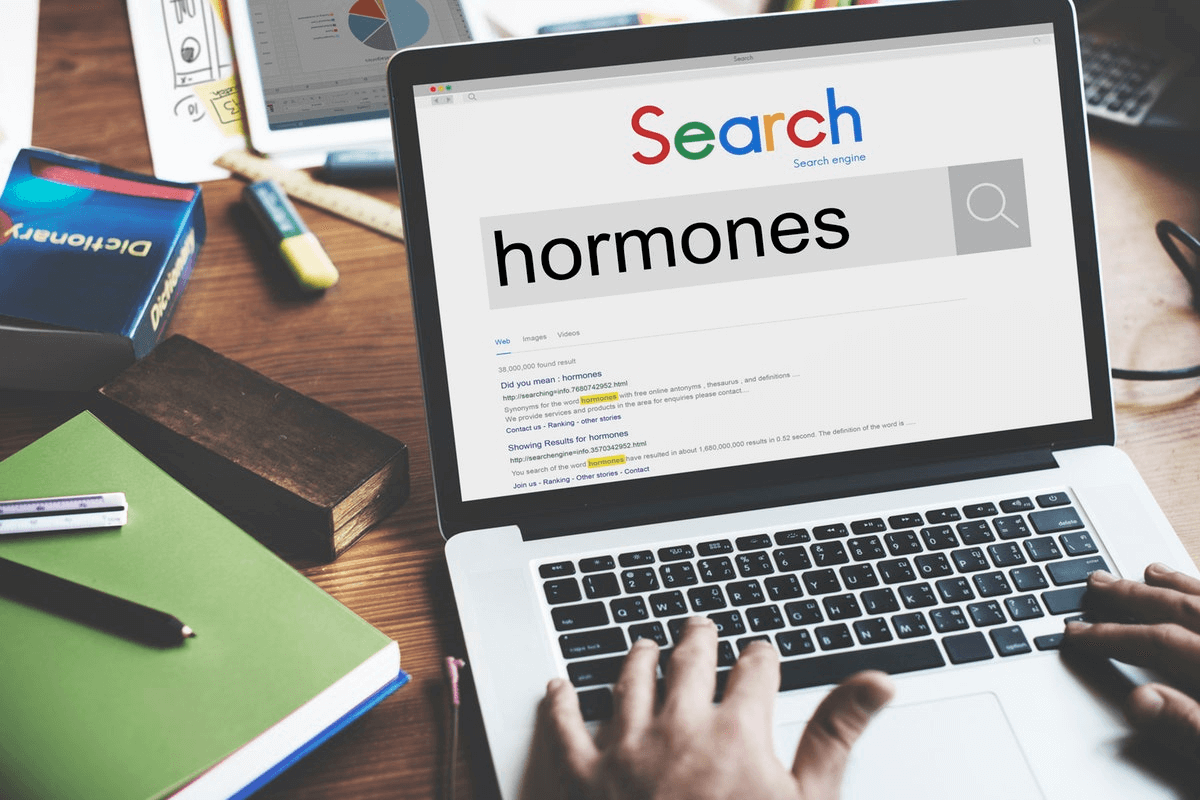

Hormones are biochemical substances in your blood. Your glands produce these biochemical substances and send them to your blood vessels to be carried around in your body to a specific destination. These biochemical substances circulate in your bloodstream, and then they transmit information to different parts of your body.
You can think of hormones as a messenger, just like an old fashion letter that contains a message your hormones go from point A to B with a set of instruction for actions to be taken by your body.
The brain is the command center that instructs glands to produce the specific hormones needed by your body to function. Hormones are produced as a reaction to your environment and the need to adapt to our environment to survive.
For example, when an event occurs in our environment, say a threat, your brain interprets it. Your brain then produces a thought, in this case, “OMG, we are in danger!” which in turn creates an emotion or feeling, e.g. fear that travel through your body via your nervous system to a specific destination and dictate an action to be taken. In this example, the feeling/emotion of fear will travel to your adrenal glands. The gland will then respond by producing a hormone called cortisol. Cortisol will then travel through your body, via your bloodstream, to command a fear-based action to protect you from any threat. Action like accelerated breathing, contraction of muscles, increased blood pressure, a decrease of serotonin, heightened memory and attention, etc.
The bottom line is hormones are carriers of information and messages for our body.
Hormonal balance in women
One very important factor to understand is that hormone levels fluctuate consistently, and it should. Female hormones are expected to fluctuate daily, monthly, and throughout a woman’s life.
Women have different hormone levels at different ages, from puberty to pregnancy, to perimenopause, and menopause. We have a natural state of hormonal imbalance so our bodies can achieve different tasks. Therefore, it’s ridiculous to expect women to have a “balanced” hormonal profile all the time.
What you want is the ability to adapt. You want to be able to adapt to different times of the month, to different situations in your life, and be able to thrive. You want to be able to cope as you go through periods of hormonal imbalance. That’s being healthy. People who are healthy are able to handle their environment well.
Being hormonally imbalanced isn’t a bad thing. It means that your body is trying to cope with something in your environment. For example, if your body has “low” estrogen, you are not broken. Your body is simply producing less estrogen as a means of coping with something. It’s your job, with the help of your health practitioner, to find out what that “something” is.
The first step to balancing your hormones is finding the root cause of what’s creating this hormonal pattern in your life. Is it stress or other health issues? Is it trauma? Maybe, it’s emotional overwhelm? Is it a mental health issue? Is it constant negative thought patterns?
Or is it food? It could be but not likely…
Nutrients and your hormones


Eating certain kinds of food won’t cause a complete hormonal collapse in your body. For example, a myth that is currently floating around is that sugar will completely deplete your body of estrogen by eating too much of it.
Well, first of all, there’s no research whatsoever to support that claim. This claim is part of a trend we are seeing now call nutritionism,which is the over-obsession over a nutrient. It is research that detaches the nutrients–example vitamin B, vitamin A–from the context of the whole food. Now, for fans of nutritional science, I’d like you to read a great article from one of my mentors Chris Kresser that talks about why nutritional science today is actually dangerous to our health. (Here’s part 1 and part 2.)
We don’t eat nutrients. We eat food. Every nutrient is just one among a whole bunch of nutrients in a food item. Nutritionism looks at a nutrient in isolation, which does not represent what’s actually happening in the human body.
The best example of that is eggs. If you wind back the clock 30 years ago, many of us shunned eggs because it contains cholesterol. One of the nutrients in eggs is cholesterol, and cholesterol was believed at the time to cause heart conditions. Even doctors would advise their patients to lay off eggs.
Today, with all the scientific research and advancements, we recognize that we were wrong about eggs.
It makes me wonder, what other beliefs centred around a certain nutrient are actually wrong because the nutrient has been studied in isolation? Sugar might be next…
Intuitive Eating and food
Now, intuitive eating keeps you away from this hyper-obsession about one food or one category of food. Instead, it encourages you to notice how you feel after you’ve eaten a certain kind of food. It makes you ask: “What is the reaction of your body when you consume that food in large amounts or in greater frequency? How does your body react?”
Intuitive eating brings you back to this innate wisdom which communicates with you through symptoms.
When we begin to eat intuitively, we quickly realize that it’s not the food. It’s our emotions, particularly stress, in most cases.
Stress and hormones
If food and nutrient in isolation aren’t the solution to “getting our female hormones in balance” then what is? One thing to consider might be stress and emotional wellness.
Aside from producing cortisol, as we covered earlier, the body has other ways to adapt and cope with the high demands of stress. One of these mechanisms is lowering the production of sex hormones aka female hormones. The body takes away some of the raw materials from the production of estrogen and progesterone and uses these ingredients to produce more cortisol.
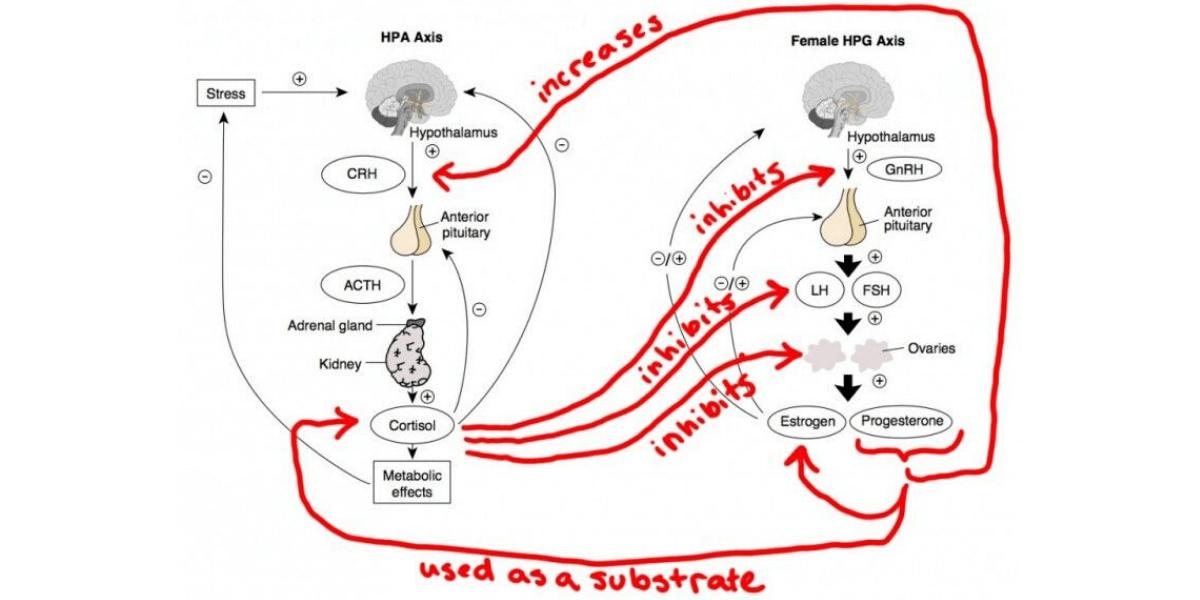

Image source: Paleo Mom
For many women, the production demand for stress hormone is so great that the body doesn’t have enough raw materials to create cortisol. And so it takes it from other places.
Why? Your body’s innate wisdom knows that, when you’re stressed and threatened with everything in your environment, you’re not in a great state for having babies. You’re not the best potential mother. Therefore, it’s going to restrict the creation of life by lowering estrogen and progesterone production and instead create the stress hormone cortisol in order for you to survive the threat in your environment.
It’s your body basically saying, “Forget about making babies right now. We’ve got to deal with stress.”
Can food and nutrients override this process? NO. That is human survival 101.
Inflammation and hormonal health
Stress also creates a process called inflammation. If you don’t know what inflammation is, think of inflammation as fire in your body.
The mechanism of inflammation allows your body to repair itself when it needs to heal. For example, when you cut your finger, you will see some swelling around the cut and then your skin will become red. That’s the inflammatory mechanism at work right there.
You have the same mechanism inside your body. When you experience muscle tension as a reaction to stress, your body creates a short-term inflammation in your muscles to create that tension. Repeated chronic stress creates inflammation in your tissues, including your glands and hormones.
Stress has a huge impact on your hormonal health. A stressful lifestyle activates the inflammatory process in your body, which then leads to this hormonal imbalance.
Another example is sleep deprivation. Inadequate sleep, even just an hour or two less than what you need, activates the stress response, releasing a cascade of inflammatory compounds. Sleep loss has also been shown to affect glucose metabolism. The occasional late night isn’t the end of the world, but if you’re chronically sleep deprived, this can make a big difference in managing your hormonal health.


Intuitive eating and hormones
But here’s another thing that causes stress: dieting and food restriction.
Studies have shown that food restriction and dieting cause your body to release cortisol, the stress hormone. When we restrict and become obsessed with food, we create a stress reaction that then cascades down to our hormones production. When you understand how stress affects your hormonal level, you’ll see the connection between intuitive eating and hormones more clearly.
The elimination diet, Whole30, and hormonal reset diet are all creating stress in your body. That’s why so many of you reach out to me and say, “I’ve done many rounds of Whole30. I’ve done the elimination diet. It gets better for a while. Now, I’m back to where I was.”
Well, that’s because you haven’t addressed the root cause. Therefore, the real problem surfaces again.
Why intuitive eating may be the key to hormonal health
When we take the time to learn intuitive eating, to rebuild a relationship of trust and respect with our bodies, we can stop restricting food and dieting. We can create space in our life to address the root cause of our health troubles.
Research has shown that a non-diet approach to health and lifestyle is more sustainable long term then diet and restrictive approach to both health and food and lead to a greater health outcome.
What happens when we clear our heads and create mental space from having to “fix ourselves” with diet and a restrictive lifestyle? We can engage with ourselves from a place of love instead of fear.
We can learn self-coaching techniques, like the one we teach in the Undiet Your Life & The Non-Diet Coaching Certification to manage our negative thoughts that lead to stress or cpach other women in this process. Also, we can prioritize better sleep habits.
Finally, we become self-compassionate. Instead of going around life thinking that we’re broken, that we have huge hormonal issues, we actually have compassion for ourselves and find loving ways to help ourselves instead of punishing ourselves with severe food restriction. Self-compassion has been proven to counteract stress.
Weight neutral approach to hormonal health
A weight-neutral approach to health is based on the idea that your health status or risk level can’t be determined solely by your weight.
It acknowledges that your weight is determined by a complex set of genetic, metabolic, physiological, cultural, social, and behavioural determinants. Many of these factors are either difficult or impossible to change.
Instead of focusing on a weight-oriented outcome, weight-neutral programs teach you to take charge of the factors within your control. These factors include your thoughts and behaviours. Taking charge of these factors will help you improve your well-being, regardless of your weight
Weight-neutral approaches to health have significantly decreased body dissatisfaction, disordered eating, and depression. They’ve also increased sustainable, enjoyable self-care behaviours such as eating and moving well in the long term.
The Going Beyond The Food Method, our proprietary methodology, is a weight-neutral approach to health. It incorporates the concept of body neutrality. Research has shown that body dissatisfaction—or body hatred—contributes to the increase of cortisol levels in the body as well as inflammation.
That’s why, as a weight-neutral framework, intuitive eating is so beneficial when it comes to hormonal health.
Getting started with a non-diet approach to health
You can access all of our services on our work with us page. We have a number of programs and service levels enabling us to serve most women:
Free Resources and Masterclasses: Get started and get to know us better!
Private coaching with Stephanie and her team Stephanie and her team of Certified Non-Diet Coaches are waiting to support you in a one-to-one setting with an individualized plan.
Undiet Your Life group coaching program is for women to learn how to eat intuitively, become body neutral, and learn self-coaching at their own pace while being supported in a group setting by Stephanie and her team of Certified Non-Diet Coaches.
Non-Diet Coaching Certification for professionals ready to integrate the Going Beyond The Food Method™️ in their practice and for women wanting to become Certified Coach and build a business coaching other women beyond the food.
What is Intuitive Eating?
It’s a proven self-care eating framework that helps you heal your relationship with food. It teaches you to distinguish between emotional hunger from physical hunger, and to tap into your eating cues — your hunger, your fullness, and your satisfaction cues–to know what, when, and how to eat. It’s supported by over 100 studies.
The Wellness Diet and Hormones
Christy Harrison MPH , RD, CDN described wellness diet as diet culture’s sneaky way of re-inventing itself to make it seem less about dieting and more about health and wellness. It basically says you’ll achieve optimal health by eating what they recommend… and very likely you’ll release the “unhealthy weight” “naturally”.
Hormonal balance in women
Women have different hormone levels at different ages, from puberty, to pregnancy, to perimenopause, and menopause. We have a natural state of hormonal imbalance so our bodies can achieve different tasks. Therefore, it’s ridiculous to expect women to have a “balanced” hormonal profile all the time.
Stress and hormones
Aside from producing cortisol, the body has other ways to adapt and cope with the high demands of stress. One of these mechanisms is lowering the production of sex hormones aka female hormones. The body takes away some of the raw materials from the production of estrogen and progesterone and uses these ingredients to produce more cortisol.
Inflammation and hormonal health
The mechanism of inflammation allows your body to repair itself when it needs to heal. For example, when you cut your finger, you will see some swelling around the cut and then your skin will become red. That’s the inflammatory mechanism at work right there.
A stressful lifestyle activates the inflammatory process in your body, which then leads to this hormonal imbalance.
Intuitive Eating and Hormonal Health
When we take the time to learn intuitive eating, to rebuild a relationship of trust and respect with our bodies, we can stop restricting food and dieting. We can create the space in our life to address the root cause of our health troubles.
Research has shown that a non-diet approach to health and lifestyle is more sustainable long term then diet and restrictive approach to both health and food and lead to greater health outcome.
Weight neutral approach to hormonal health
A weight-neutral approach to health is based on the idea that your health status or risk level can’t be determined solely by your weight.
That’s why, as a weight-neutral framework, intuitive eating is so beneficial when it comes to hormonal health.


